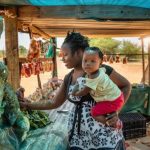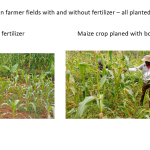By John Wilson
I am writing this on World Water Day, March 22nd. The UN’s tag line for today is ‘Be the change. Every drop counts.’ This is very true. If we are going to return water cycles everywhere to what they used to be, then it will start with each one of us understanding the basics of the water cycle and acting to support a healthy water cycle.
The action we need to take is not that complicated. The complexities lie in the wonderful way in which Nature drives the water cycle, when the basics are in place. We do not fully understand these complexities, but we understand what we need to do.
Nearly everywhere around our African continent, water falls as rain, falling as snow in a few spots here and there. If that rainwater sinks into the ground, it is a productive force. If it runs off the ground it is a potentially destructive force. Our task is to restore ecosystems everywhere, especially our farming ecosystems, so that water sinks into the ground as soon after reaching the ground as possible. Most healthy soils, full of biological life, infiltrate water at a fast rate and once the surface is saturated sends the water downwards to recharge the water table. Wherever we see clean water running in streams and rivers we know that these are being recharged by underground water. This is a simple and clear indicator of a healthy water cycle in that catchment area.
In healthy, natural situations Nature has ensured that water enters the soil and does not run off. In our land-use almost everywhere we’ve created damaged landscapes where much water runs off. We now have to do everything we can to reverse that situation and get the water into the ground. There are some basic principles to guide this process. Putting these principles into practice requires everyone involved in any land-use to take part. This is because the more we can all sink water at our own source, the less chance it has to be damaging and the more we can contribute to a healthy water cycle.
For example, if we live on a slope of even a slight gradient, our task is to ensure that every drop of water that runs of the roof or any paths and roads on the land we are responsible for sinks into the ground. If not it will join forces with other run-off water and instead of helping recharge our spring, for example, it will run off, taking soil with it. Run-off water accumulates and the more it accumulates the more damage it causes. It’s as simple as that.
While the UN’s tagline above is good, too many of the conventional approaches to ‘water’ have forgotten the basics. Dams are built and boreholes dug without thinking about or doing enough to sink every drop of rainwater into the ground. In my home country of Zimbabwe, with good intentions, hundreds of dams were built at great cost after independence in the 1980s. They are full of fine silt now and only really good for growing bananas, expensive bananas at that! We hear stories everywhere of boreholes drying up – of course they will if they are not recharged.
The Water School Africa (WSA) is being set up to bring attention back to the basics of holding water in our landscapes, every drop of water in all our landscapes. Putting these basics into practice has to be driven by the families and communities living in these landscapes. Supporting this process is where our emphasis needs to be.
There is much good work going on across the continent along these lines, supporting innovative farmers and communities who understand water and who are using a range of methods and systems to hold water in their landscapes. WSA aims to find ways to share these practices more widely, giving them much more prominence. It aims to connect communities more and to stimulate and catalyse much greater spread of these methods and practices. Just about everything we do in our landscapes starts with water. If we do not manage the water we are gifted as rain we are immediately on a wrong footing. ‘Be the change. Every drop counts.’
John Wilson is a free range facilitator and activist in East and Southern Africa, with strong links to West Africa. He has worked with many different organizations at different levels — from community-based organisations to regional and continental networks, to help facilitate a stronger food sovereignty movement in Africa. Increasingly, he is focused on helping to catalyze and support collaborative and strategic work on agroecology and food sovereignty. He is presently the Chair of the Citizen and Agroecology Working Group of AFSA.

































